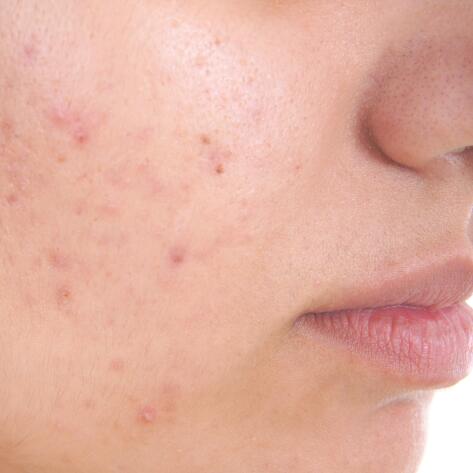How to avoid acne scars

What causes acne scars?
Acne is a collection of skin lesions. And when your skin is attacked, it reacts. The skin uses an inflammatory mechanism to defend against microbes and a restore process to restore damaged tissue.
Unfortunately, in some cases, once the blemish has disappeared, the inflammation remains as a mark. In other cases, the skin is unable to restore itself completely and leaves a scar behind. As you’ll have gathered, prevention is better than cure when it come to acne.
We know that acne is a sensitive issue, and this is true for all ages. This is why it's important to take the bull by the horns as soon as possible, given the risk of aggravating blemishes and leaving scars. Nothing beats expert advice to find solutions for your skin!
Why treating your acne properly is essential
What’s the best way not to have scars? Avoid the cause. We can all agree that this is logical, but it's not to be taken for granted.
When it comes to acne, the priority is to treat the acne itself with appropriate care. The more severe the acne and the later treatment begins, the greater the risk of scarring. Each type of acne has a specific treatment. Don’t hesitate to consult a dermatologist or ask your pharmacist for advice.
Which skincare routine is best for your acne?
Minimalism is having a moment... And it includes the way you treat your skin. Don't use lots of different products. Simplicity and efficiency go hand in hand: use a gentle cleanser, non-comedogenic creams and care products targeted for acne-prone skin.

4 rules
to avoid acne scars
2 - Moisturize your skin using a targeted moisturizing cream. This step promotes healing.
4 - Protect your skin from the sun with a very high protection sun care product. Excessive sun exposure can cause your skin to become hyperpigmented and lead to more visible marks.
FRIENDLY, EXPERT ADVICE
Help! I've squeezed my spot!
You've succumbed to the temptation to pick, pop and squeeze your spots. Now you'll have to be twice as kind to your skin and give it a hand so that it can restore itself.
A broken acne spot is like a scratch on your face, it’s important to avoid any risk of infection.
After cleansing the area well with a mild product, apply a cream twice a day that promotes restore and limits the risk of scarring.
And next time, be patient! It’s better to have a spot that lasts a few days than a scar for life, right?
OUR SOLUTIONS TO RESTORE YOUR SKIN
The essentials for restoring, soothing and purifying sensitive and fragilized skin for the whole family
- Restorative Protective Cream
Best Seller
Cicalfate
Restorative Protective CreamRestores - Soothes - Protects - Hand Restorative barrier cream
Cicalfate
Hand Restorative barrier creamHydrates - Protects - Restores
NEWSLETTER
We're always here for your skin! All our tips on how to take care of your skin every day.

Which skin care routine should you adopt?
Identify what it really needs with the help of our experts and discover the most suitable skin care routine for you.




